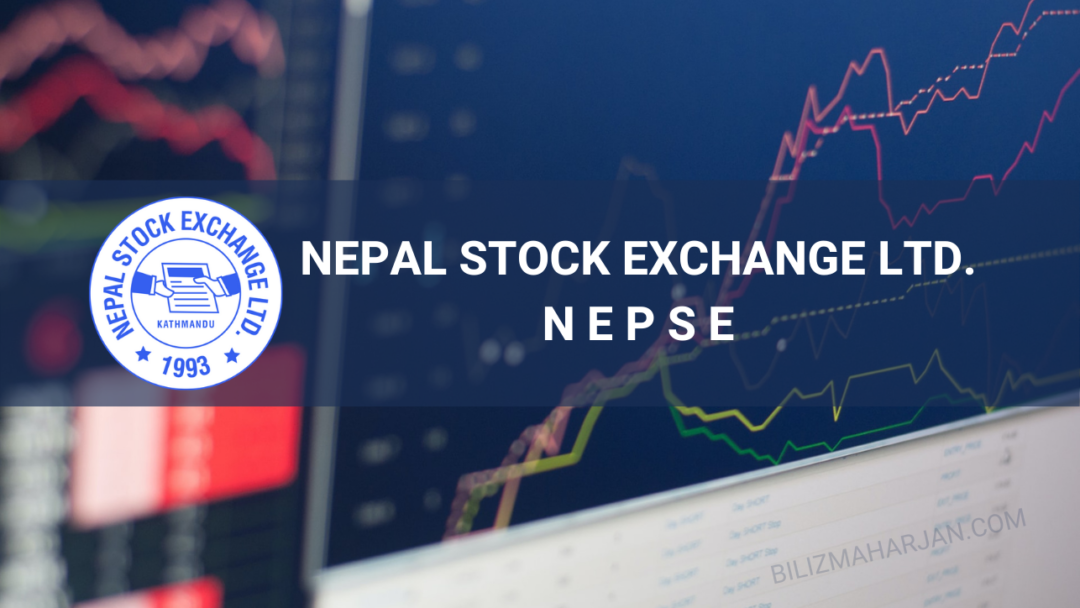(Download my FREE eBook ‘The Basics of Investing in the Stock Market of Nepal’.)
Nepal Stock Exchange (NEPSE) is the only stock exchange in Nepal. The number of investors in the stock market of Nepal has been increasing in the past months. From experienced investors to newbies, everyone has the same purpose for investing in stocks – to make money.
Investing in stocks is a good way to make some money. You can earn passive income by investing in stocks. A passive income is an income generated from a source where one does not have to be actively involved every time. How is investing in stocks a passive income? Because after you invest your money in stocks, you will receive dividends as income from your investments.
If you are a newbie in the stock market, you should first understand what stocks are and how the stock market works. You can learn about it in my previous article on the stock market.
The stock market of Nepal is at its growing stage. As of writing this post, the index of the market is at 1,645.67. I will be discussing the 10 things you should know about the stock market of Nepal in this post. So, let us begin.
If you are already involved in the market and are an active investor, the following might not be new things for you. But I assure you that they can add some value to your knowledge of the stock market.
1. Establishment and Early Days
The Nepal Stock Exchange (NEPSE) was established in the year 1993 AD (2050 BS). But, it opened its trading floor only on 13th January 1994. The first companies to be listed on NEPSE were Biratnagar Jute Mills Ltd. and Nepal Bank Ltd. In the early days, trading of securities took place through an open cry-out system. Trading through computers began in 2063 BS.
2. Structure
NEPSE has a paid-up capital of NRs.50,00,00,000. The shareholders of NEPSE include the Government of Nepal, Nepal Rastra Bank, Employees Provident Fund, Rastriya Banijya Bank (former, Nepal Industrial Development Corporation), Laxmi Bank Ltd., Prabhu Bank Ltd., and other securities businessperson (brokers). The detailed structure is shown below.
| S.No. | Shareholders | Ownership (%) | No. of Shares |
| 1 | Government of Nepal | 58.66 | 2,933,123 |
| 2 | Nepal Rastra Bank | 14.6 | 729,990 |
| 3 | Employees Provident fund | 10 | 500,000 |
| 4 | Rastriya Banijya Bank | 6.14 | 306,816 |
| 5 | Laxmi Bank Ltd. | 5 | 250,000 |
| 6 | Prabhu Bank Ltd. | 5 | 250,000 |
| 7 | Others | 0.6 | 30,072 |
(Source: Nepal Stock Exchange Ltd.)
3. Securities Board of Nepal (SEBON)
The Securities Board of Nepal (SEBON) was established by the Government of Nepal on June 7, 1993, as an apex regulator of Securities Markets. It has been regulating the market under the Securities Act, 2006. The major functions and duties of SEBON include; issue necessary securities regulations and directives; share registration of public companies; issue license to operate stock exchange; regulate and systematize the issue, transfer, sale, and exchange of registered securities; issue license to stockbrokers, dealers, merchant bankers, and fund managers; issue license to depository company, depository participant, and credit rating agency; and more.
4. Primary and Secondary Markets
a) Primary Market
A primary market is a market where investors can buy the stocks of a company when it is issued in the market for the first time. The companies issue stocks primarily through an IPO (Initial Public Offering). The public will be able to invest in the shares of the companies by applying for the IPO. The process of applying for an IPO is explained in point number 6 below. Investors can apply for an IPO and buy the shares of the company at a base price (which is usually Rs. 100 per share for companies in Nepal).
The public can also invest in the primary market through FPOs (Follow-on Public Offerings) – a process by which a company, which is already listed on the Nepal Stock Exchange, issues new shares to the public. Both new investors and current shareholders can invest in the FPO of a company.
b) Secondary Market
The secondary market is where investors can trade (buy/sell) the stocks of companies that are already listed in NEPSE. To buy/sell a stock in the secondary market, an investor has to pay the price at which the company is currently trading in the market. The process of investing in the secondary market is explained in point number 7 below.
5. Requirements to Invest in the Stock Market of Nepal
There are several things necessary to start investing in the stock market of Nepal. You must ensure that you have all these things ready before you begin investing. The following are requirements to invest in the stock market of Nepal.
- Demat Account
- MeroShare Account
- Stockbroker/Trading Account
- Bank Account
a) Demat Account
A Demat account is an account to store your shares, just like a bank account is an account to store your money. It is compulsory to have a Demat account for you to invest in the stock market. To open a Demat account, you can go to any of the companies that are licensed by SEBON as a Depository Participant (DP). Usually, banks, merchant banks, and stockbrokers are licensed to open a Demat account for their clients. These companies will take a certain fee for opening your Demat account. The DP will provide you with your Demat account number (also known as BOID) and MeroShare credentials.
b) MeroShare Account
A MeroShare account is an account that gives you access to your shares electronically. This account allows you to view the details of your shareholdings and the current value of your portfolio. Furthermore, it also gives access to your transaction history and your purchase sources. The application of IPOs, FPOs, right shares, etc. can also be done through your MeroShare account. Your MeroShare account is usually opened along with your Demat account if you specify it clearly while filling up the form for your Demat account. To access your MeroShare account, you have to go to https://meroshare.cdsc.com.np/ and log in with the credentials provided by your DP.
c) Stockbroker/Trading Account
If you want to buy/sell shares in the secondary market, you need a stockbroker account. A stockbroker buys and sells shares on behalf of clients. There are currently about 50 stockbrokers in Nepal. You can find the appropriate stockbroker and open an account with them. Some stockbrokers are licensed as DP as well, which means you can open your Demat account, MeroShare account, and stockbroker account all at the same place.
A trading account gives you access to an online system, known as the Trade Management System (TMS), where you can place your buy/sell orders yourself. You will not need to call your broker to place the order. You can open your trading account at the stockbroker’s office itself. Your stockbroker will provide you with the process and other details necessary for the trading account. Stockbrokers usually ask for collateral when you open a trading account with them. Collateral is basically an assurance amount (either in cash or cheque) that allows you to purchase shares worth four times the amount you have provided as collateral to the broker. For example, if you want to purchase shares worth Rs. 1,00,000 through the trading account, you will have to provide a collateral amount of Rs. 25,000 to the broker.
d) Bank Account
It is quite obvious that you need money to buy shares. A bank account will be linked with your Demat account, MeroShare account, and stockbroker account. If you are purchasing an IPO, the amount will be automatically deducted from your bank account, which you have linked with your Demat/MeroShare account. In the secondary market, however, you can pay your broker from any of your bank accounts. A bank account is also required when you receive cash dividends. The dividend amount will be automatically credited to your respective bank account.
6. Investing in the Primary Market
To invest in the primary market, first, you must have fulfilled all the requirements listed in point number 5 (except stock broker/trading account). Most of the new investors do not know how to apply for an IPO in the stock market of Nepal. In the early days, people had to fill up forms and apply for IPOs by visiting the issue-managing companies. Thankfully, we have an easy way to apply for IPOs now. However, here you need an additional requirement – CRN Number. You can receive your CRN number by filling up a C-ASBA form at your bank (Remember: Your CRN number is provided by the bank, not your DP. Also, the bank must be the same one which you have registered in your Demat Account). Here are the steps to apply for an IPO in the primary market.
- Step 1: You must have the following – Demat Account, MeroShare Account, and CRN Number.
- Step 2: Log in to your MeroShare Account by going to the link provided above in point number 5 (b).
- Step 3: Go to My ASBA > Select Apply for Issue > Select which issue you want to apply for.
- Step 4: Fill up the details including how many units you want to apply, the bank from which you want to debit the amount, and provide your CRN Number.
- Step 5: Confirm the details by providing the Transaction PIN. (You must set up your transaction PIN when you first log in to your MeroShare account).
- Step 6: It’s done! You can check your application details by going to the Application Report section of My ASBA.
7. Investing in the Secondary Market
To invest in the secondary market, you will need all the requirements listed above in point number 5. The first step to investing in the secondary market is that you must be aware of the market. You must know how the market works and how the prices of stocks are determined. You must also be aware of the current stock trading prices. These are provided on the official website of NEPSE in the Stocklive section or the Marketdepth section. Here are the basic steps to invest in the secondary market.
- Decide which company’s stock you want to buy and how many units you want to buy.
- Check the current trading price of the company.
- Place a buy order either through TMS or by calling your broker and asking them to place the order for you.
- Your broker will notify you via call/text/email when your order has been executed.
- Pay the money to your broker and get the shares in your Demat account.
The process is similar if you want to sell your shares.
(It is highly recommended to study a company properly before you purchase its shares in the secondary market, especially if you are a new investor.)
8. Market Timings
The Nepal stock market (NEPSE) opens at 11:00 a.m. and closes at 3:00 p.m. from Sunday to Thursday. On Fridays, the market opens at 11:00 a.m. and closes at 1:00 p.m. (Updated: 15 June 2022)
9. Circuit Breakers and Price Range
Circuit-breaker points represent the thresholds at which trading is halted market-wide for single-day gains/declines in the NEPSE index. Circuit-breakers are applicable in three stages – when the market gains/declines by 4%, 5%, and 6%.
- If the market gains/declines by 4% in the first hour of market opening (i.e. from 11:00 am to 12:00 pm), the trading will be halted for 20 minutes.
- If the market gains/declines by 5% in the second hour of market opening (i.e. from 12:00 pm to 1:00 pm), the trading will be halted for 40 minutes.
- And, if the market gains/declines by 6% at any point, the trading will be halted for the rest of the day and the market will be closed instantly.
Price Range applies to individual companies listed in NEPSE. The circuit breaker for individual companies applies at a 10% price movement upward or downward. The trading will be halted for the company’s stock at a price higher or lower than 10% of the last traded price.
10. Fees, Commissions, and Tax
Investors have to pay certain fees and commissions to brokers and regulatory bodies when trading shares. Below are the details.
- Broker commission: 0.4% to 0.6% per transaction amount (Update: It has been reduced to 0.27% to 0.40%)
- DP Charge: Rs. 25 per company
- SEBON fee: 0.015% of the transaction amount
- Capital Gain Tax (CGT) for individual investors: (Updated: July 16, 2021)
- 7.5% of Net Profit with a holding period of fewer than 365 days
- 5% of Net Profit with a holding period longer than 365 days
- Tax on cash dividend: 5%
- Tax on bonus shares: 5% on par value
These were the 10 things you might or might not have known about the stock market of Nepal. I hope this article was insightful. You can share your thoughts and queries in the comments section below or you can write to me personally if you want to know more about the stock market of Nepal.
Like I said, investing in stocks can be a good way to make money. But it can also lead you to lose your money if not done with proper information. I advise you to gain as much knowledge as you can on the stock market before you start investing. The more you learn, the more you will be able to earn. So make your decisions wisely and seek help from the people who know about investing in the stock market. Lastly, have fun with investing because it’s not just about making money, it is also about enjoying the process.





Capital gain tax is updated based on short and long-term investment from this fiscal year, right?
Yes. Thanks for the reminder, Madan. I have made the update.